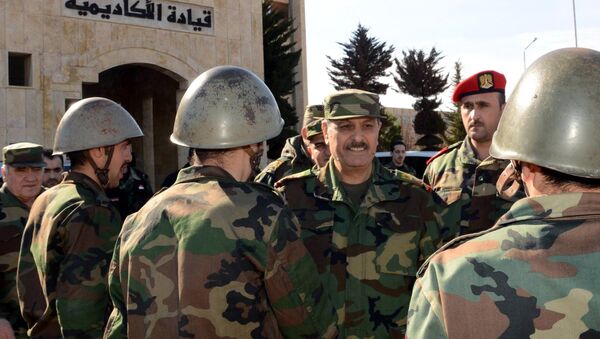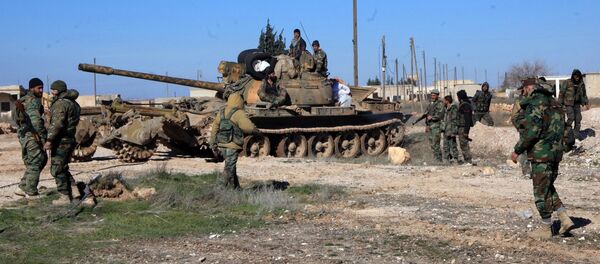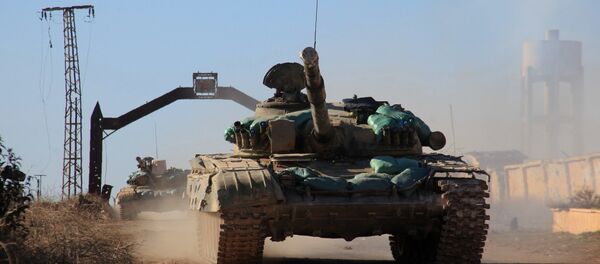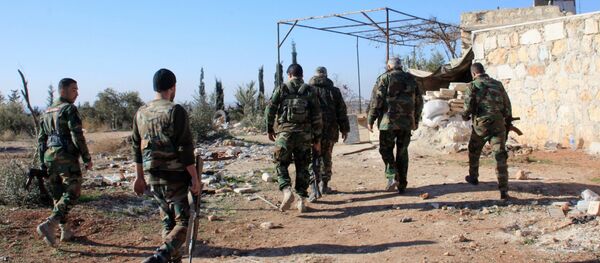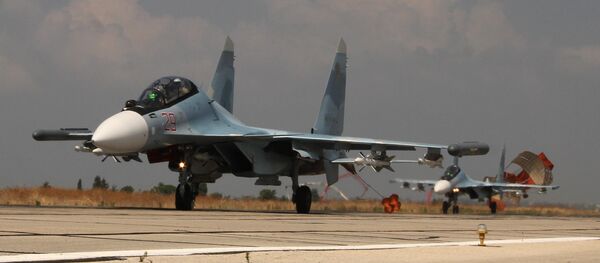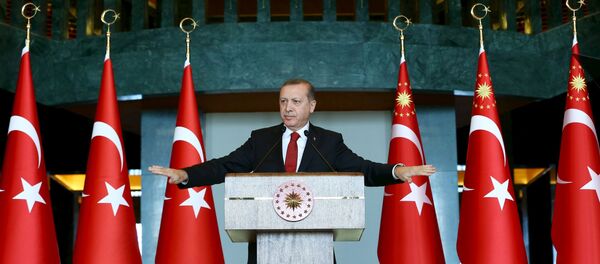The northern Syrian city of Aleppo is the country's second city (and before the war in Syria began, its largest). In the last few months, the situation in the city, contested by government and rebel forces, has turned 180 degrees.
"The Syrian army's success," the columnist noted, "has been made all the greater because at the start of January the rebels sent reinforcements to Aleppo to resist what they expected would be a government offensive there. Now those reinforcements, together with the rebel fighters previously in the city, are encircled and trapped."
Moving forward, as the Syrian Army and allied local militias, plus Syrian Kurdish forces in the country's north, move to take control of the Syrian-Turkish border, and to cut off the rebels' supply routes with both Turkey to the north and the Daesh terrorists to the east, the regional operation is turning out to have implications for the entire Syrian theater. This, in turn, "has given impetus to all sorts of geopolitical tremors," military analyst and Expert magazine contributor Pyotr Skarabahaty explains.
In a detailed analysis of the situation on the ground, the journalist suggests that the Aleppo operation has already had major political implications for the region, leading to the so-called 'moderate' Islamists walking out on the Geneva peace talks, to a reassessment of the situation by Washington, and to a new narrative in Western media "about tens of thousands of Syrian civilians fleeing evil Russian bombs."
"The situation is changing almost every day," Skarabahaty writes, "but so far [Damascus and Moscow have] the strategic initiative, interfering with regional and Western powers ability to facilitate an appropriate response" to reinforce the jihadists.

"The Syrian Arab Army (the SAA)," the journalist explains, "still does not have enough forces for a massive offensive on all fronts, and Russian aviation's participation too, is limited. Therefore, while Assad's forces and allied militias press against the militants in one part of the country (until recently – in Latakia, and in the province of Daraa to the south), in others they accrue their strength. Intense preparations for the operations outside Aleppo were conducted over several weeks, featuring the massing of infantry and mechanized units, including missile systems, rocket launchers and Russian-delivered T-90s with trained crews."
"But where exactly the [Syrian and Russian] allies would strike was unclear, and this was extremely unnerving to the extremists – after all, there were many possibilities. However, in hindsight we can say that the united General Staff has not deviated from the general line: the main task of the first phase of the operation is to close the Syrian border with Turkey and with Jordan, through which arms and jihadist volunteers flow into the country."
"Damascus struck to Aleppo's northwest toward the Shiite enclave cities of Nubl and Zahraa, which for over four years had been surrounded by the jihadists. In this operation, a new SAA tactic stood out: to bypass well-fortified positions, to search for weak spots in the area, and drive a mechanized wedge into the area following softening up by artillery and air power. Then, the army returns to the fortified area, but from the rear. In a few days, dozens of settlements were captured, and the land bridge was reinforced from counterattacks."
"Here in general, we can complement [Russia's] military planners, who had been planning for the Syrian operation over the past six months," the journalist noted. "Their efforts remain invisible to the layman, but are critical to success and the minimization of losses on the front."
"It's difficult to imagine how much effort has been expended to create a single operational plan ensuring cooperation between the motley crew of the pro-Assad coalition, featuring Lebanese, Iraqi, Iranian, Syrian, and Kurdish militias and armies, Shiites and Sunnis, different national groups, units with varying degrees of training, experience and equipment, not to mention logistics, and transport. The high level of professionalism of Russian military advisors is clear."
"The jihadist districts of Aleppo have come under threat, previously fighting it out for months with army units in difficult conditions featuring a dense concentration of buildings and underground tunnels."
Importantly, Skarabahaty says, "the army is obviously moving in the direction of the north toward the Turkish border. Here, the Islamists quickly strengthen their southern approaches and receive reinforcements from Turkey. The army's ultimate goal is to take the border 'under lock and key'; this is a major factor geopolitically, causing a sharp anxiety among Ankara and its allies."
"What's so important about this corridor for the anti-Assad front? First, as has already been said, it is here that weapons and militants make their way to Syria, and in large quantities. Of course, Idlib province (to Aleppo's southwest) has a much longer border with Turkey; therefore speaking of the situation as a 'pocket' is not entirely appropriate. The essence is in the convenience of logistics. It is Aleppo province which features wide highways, established border crossings and smuggling routes. And the portion of the city of Aleppo which is not controlled by Damascus serves as a major logistics hub for the flow of terrorists to other areas. The Idlib border is much less convenient, with mountain ranges making it impossible to pass large parties [of weapons, of fighters] through."
BREAKING: Idlib province 'on verge of a catastrophe' as regime severs vital supply route. https://t.co/t5SiD7W9A7 pic.twitter.com/3pWZ3sgrMP
— Syria Direct (@SyriaDirect) 3 февраля 2016
"But no less important," the analyst notes, "is the logistics route which once passed through the area – through which an active trade [of food and oil] took place between the jihadists and Daesh."
"The agreements, concluded with Ankara's participation, provided for Daesh oil to be transported to the northern Syrian province, in exchange for food. In this way, for both sides, the trade route literally served as a 'lifeline', because the territory under Daesh's control consists mainly of oil fields, while pro-Turkish groups occupy relatively fertile land, but without energy deposits and processing facilities."
At the same time, with 50,000 refugees fleeing for Turkey in connection with the Syrian offensive, "Ankara," the journalist warns, "is sounding the alarm and calling on the whole world to pay attention to the crisis which it says was 'triggered by the Russian air strikes'. Border crossings have been closed, crowds accumulate and a picture of a 'humanitarian apocalypse' is being presented in the Western media."
"It seems," Skarabahaty continues, "that this card will soon be played by Ankara and the West to put pressure on the Syrian-Russian coalition – and perhaps serve as a pretext for a ground invasion."
"The fact is that Russian specialists had deliberately proposed a flight path to their foreign colleagues indicating that the nature of Ankara's plans is absolutely clear to the Russian General Staff, and that the reaction to follow may be extremely tough."
Last week, citing Syrian images showing Turkish self-propelled artillery units on the Syrian border, Defense Ministry spokesman Maj. Gen. Igor Konashenkov stressed that Russia "considers Turkey's move as a dangerous precedent and an attempt to hide its illegal military activity on the border with Syria."
Meanwhile, Skarabahaty explains, from Ankara's point of view, the task of "creating a buffer zone on its southern borders is a task of paramount importance; the question which arises is whether the zone will be located on Turkish or Syrian territory. With Russia's entry into the conflict, hopes of overthrowing the Syrian government have vanished; Ankara had relied on jihadists under its control, but has now been forced to set up blocking detachments to prevent militants fleeing from Russian air strikes coming back into Turkey."
"The other uses for the buffer zone include keeping the Kurdish offensive at a distance, preventing the two Kurdish enclaves in northwest and northeast Syria from uniting. Finally, a hypothetical zone of influence is important for trading with Daesh and supplying it with fighters."
"The choice can be put as follows: whether Turkey is ready to act unilaterally with the tacit support of the West, or agree on an initiative to align with the US coalition."
Unfortunately, with the Erdogan government effectively blackmailing Brussels by threatening to 'dump' its refugees on Europe, "the EU may decide to close its eyes on a Turkish military operation, as it has already done with the growing carnage in the Kurdish areas of Turkey." The German chancellor's remarks on being 'shocked by the suffering of tens of thousands' due to Russian airstrikes indicates that "she is willing to play this game," Skarabahaty noted.
Ultimately, the analyst argues, "it's important to understand that a Turkish intervention would not mean a direct military confrontation between Turkey and Russia. It's very likely, [instead], that we will see another episode of a hybrid war; and it cannot be excluded that, hardened by four years of war, Assad's forces, equipped with Russian tanks, will be able to rebuff the Turks."
At the same time, Skarabahaty warned that the danger stemming from the US's off-again on-again, befuddled policy with regard to the conflict in Syria should not be discounted. In any case, Washington's alliance of convenience with the Kurds, and its growing ideational conflict with Ankara have complicated things; the question is whether the US is willing to abandon the Kurds in favor of Ankara and Erdogan.

